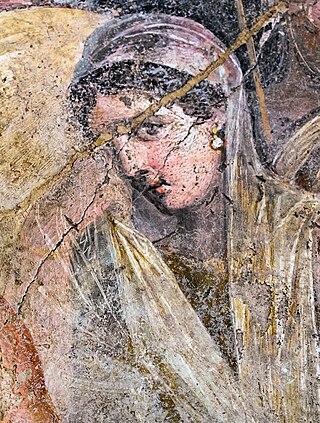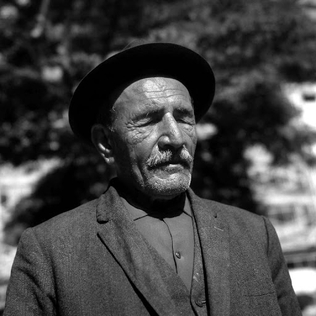Related Research Articles

Briseis, also known as Hippodameia, is a significant character in the Iliad. Her role as a status symbol is at the heart of the dispute between Achilles and Agamemnon that initiates the plot of Homer's epic. She was married to Mynes, a son of the King of Lyrnessus, until the Achaeans sacked her city and was given to Achilles shortly before the events of the poem. Being forced to give Briseis to Agamemnon, Achilles refused to reenter the battle.

Melanie Anne Safka Schekeryk, professionally known as Melanie or Melanie Safka, was an American singer-songwriter.

Harvest Moon is the 21st studio album by Canadian-American musician Neil Young, released on November 2, 1992. Many of its backing musicians also appeared on Young's 1972 album Harvest.
Shirley Elizabeth Collins MBE is an English folk singer who was a significant contributor to the British Folk Revival of the 1960s and 1970s. She often performed and recorded with her sister Dolly, whose accompaniment on piano and portative organ created unique settings for Shirley's plain, austere singing style.
"She Moved Through the Fair" is a traditional Irish folk song, with a number of iterations, that has been performed and recorded by various artists. The narrator sees his lover move away from him through the fair, after telling him that since her family will approve, "it will not be long [love] 'til our wedding day". She returns as a ghost at night, and repeats the words again, intimating her own tragic death and the couple's potential reunion in the afterlife. There are numerous alternate versions, some sung about a male lover, with different lyrics, such as "Our Wedding Day" and "My Young Love Said to Me", among others.
Prince Charming is a fairy tale stock character who comes to the rescue of a damsel in distress and must engage in a quest to liberate her from an evil spell. This classification suits most heroes of a number of traditional folk tales, including "Snow White", "Sleeping Beauty", "Rapunzel" and "Cinderella", even if in the original story they were given another name, or no name at all.

Stephanie Dorthea Mills is an American singer and songwriter. She rose to stardom as "Dorothy" in the original seven-time Tony Award winning Broadway run of the musical The Wiz from 1974 to 1979. The song "Home" from the show later became a Number 1 U.S. R&B hit and her signature song.

Linda Thompson is an English singer-songwriter.
"Cotton-Eyed Joe" is a traditional American country folk song popular at various times throughout the United States and Canada, although today it is most commonly associated with the American South. The song is mostly identified with the 1994 Rednex version, which became popular worldwide. The song is also an instrumental banjo and bluegrass fiddle standard.

Âşık Veysel was a Turkish Alevi ashik, bağlama virtuoso, and folk poet. He was born and died in the village of Sivrialan, Sivas Province, in the Ottoman Empire. Blind since the age of 7, Veysel's songs were typically melancholic, and dealt with a range of themes revolving around morality, love, faith, life and death, patriotism, nature, and his own perception of the world as a blind man.
The Bonnie Lass o' Fyvie is a Scottish folk song about a thwarted romance between a soldier and a woman. Like many folk songs, the authorship is unattributed, there is no strict version of the lyrics, and it is often referred to by its opening line "There once was a troop o' Irish dragoons". The song is also known by a variety of other names, the most common of them being "Peggy-O", "Fennario", and "The Maid of Fife".

Sloan Wainwright is an American artist and member of the American independent music scene. Her musical style consists of a combination of folk, rock, jazz, and blues; which she developed while writing and performing in the Greenwich Village area of New York City. She released 11 albums between 1996 and 2021.

Classic Disney: 60 Years of Musical Magic is a five-volume compilation series, each containing 25 songs compiled from Disneyland and Walt Disney World, various Disney films in animation and live-action, and the Walt Disney anthology television series. Each volume was released individually on CD and cassette between 1995 and 1998. Volume I was released on March 28, 1995, Volume II on September 12, 1995, Volume III on July 2, 1996, Volume IV on July 15, 1997 and Volume V on September 22, 1998. In 2000, a box set was released containing volumes 1 - 3, followed by a box set containing volumes 1 - 4 in 2001, Finally, a box set containing all five volumes packaged in a slipcase was released by Walt Disney Records in Australia, Japan, North America and Europe in 2003.
"Seventeen Come Sunday", also known as "As I Roved Out", is an English folk song which was arranged by Percy Grainger for choir and brass accompaniment in 1912 and used in the first movement of Ralph Vaughan Williams' English Folk Song Suite in 1923. The words were first published between 1838 and 1845.

Feste is a fictional character in William Shakespeare's comedy Twelfth Night. He is a fool attached to the household of the Countess Olivia. He has apparently been there for some time, as he was a "fool that the Lady Olivia's father took much delight in" (2.4). Although Olivia's father has died within the last year, it is possible that Feste approaches or has reached middle age, though he still has the wit to carry off good 'fooling' when he needs to, and the voice to sing lustily or mournfully as the occasion demands. He is referred to by name only once during the play, in answer to an inquiry by Orsino of who sang a song that he heard the previous evening. Curio responds "Feste, the jester, my lord; a fool that the lady Olivia's father took much delight in. He is about the house" (2.4). Throughout the rest of the play, he is addressed only as "Fool," while in the stage directions he is mentioned as "Clown."
The Suffolk Miracle is Child ballad 272 and is listed as #246 in the Roud Folk Song Index. Versions of the ballad have been collected from traditional singers in England, Ireland and North America. The song is also known as "The Holland Handkerchief" and sometimes as "The Lover's Ghost".

Hebrew Melodies is a collection of 30 poems by Lord Byron. They were largely created by Byron to accompany music composed by Isaac Nathan, who played the poet melodies which he claimed (incorrectly) dated back to the service of the Temple in Jerusalem.
"A Brisk Young Sailor (Courted Me)" (variously known as "Bold Young Farmer", "The Alehouse", "Died For Love" and "I Wish My Baby Was Born" amongst other titles) is a traditional folk ballad (Roud # 60, Laws P25), which has been collected from all over Britain, Ireland and North America. The song originates in England in the early 1600s.
"The Lochmaben Harper" or "The Blind Harper" is a traditional British Folk ballad and is one of the ballads collected by Francis Child in The English and Scottish Popular Ballads (1882–1898).
References
- ↑ John Harrington Cox Folk-Songs of the South 1963 - Page 342 CHARMING BEAUTY BRIGHT American texts have been printed as follows: Journal, xxvi, 176 (Kittredge; taken down in 1877 or 1878 from an old lady born in Boston in 1799); xxvm, 147 (Perrow; Mississippi); xxix, 184 (Tolman; Indiana); ...
- ↑ James P. Leary Wisconsin Folklore 0299160335 -1999 - Page 219 and "Once I Courted a Charming Beauty Bright" on Folk Musk From Wisconsin (AAFS L55);
- ↑ "Song Information". maxhunter.missouristate.edu. Missouri State University. Retrieved 31 August 2022.